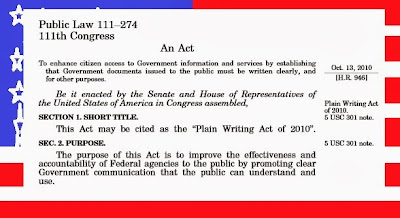Did you know that there's a law that requires the federal government to write new publications, forms,
and publicly distributed documents in a “clear, concise, well-organized”
manner?
Well, "requires" might be a little strong, since the Plain Writing Act of 2010, Pub. L. 111-274, 124 Stat. 2861, explicitly denies judicial review and says that the act cannot be construed to create any enforceable right or benefit. But, still, it says that "Beginning not later than 1 year after the date of enactment of this Act, each agency shall use plain writing in every covered document of the agency that the agency issues or substantially revises." (emphasis added)
Perhaps you haven't noticed a dramatic change. That might be because agency response to the law has been, um, a little uneven. That's according to the 2013 Plain Language Report Card from the Center for Plain Language. The Center gives the Social Security Administration an "A" for compliance with the act and an "A" for plain language (nicely done!), but gives both HUD and Treasury "F" for compliance and "D" for plain language (needs improvement!).
The Center for Plain Language is about plain language everywhere, not just in the federal government. Its annual ClearMark Awards include the public, non-profit, and private sectors. The Center's Resources page includes a checklist for setting up a plain language program from the first coordinator of Washington State’s Plain Talk program.
For inspiration, watch this TED Talk, "Let's Simplify Legal Jargon," by Alan Siegel:
And for what not to do, look at the examples from the Center for Plain Language's WonderMark Awards.


No comments:
Post a Comment